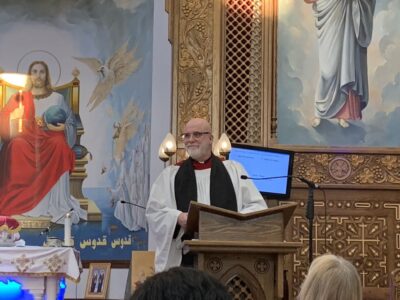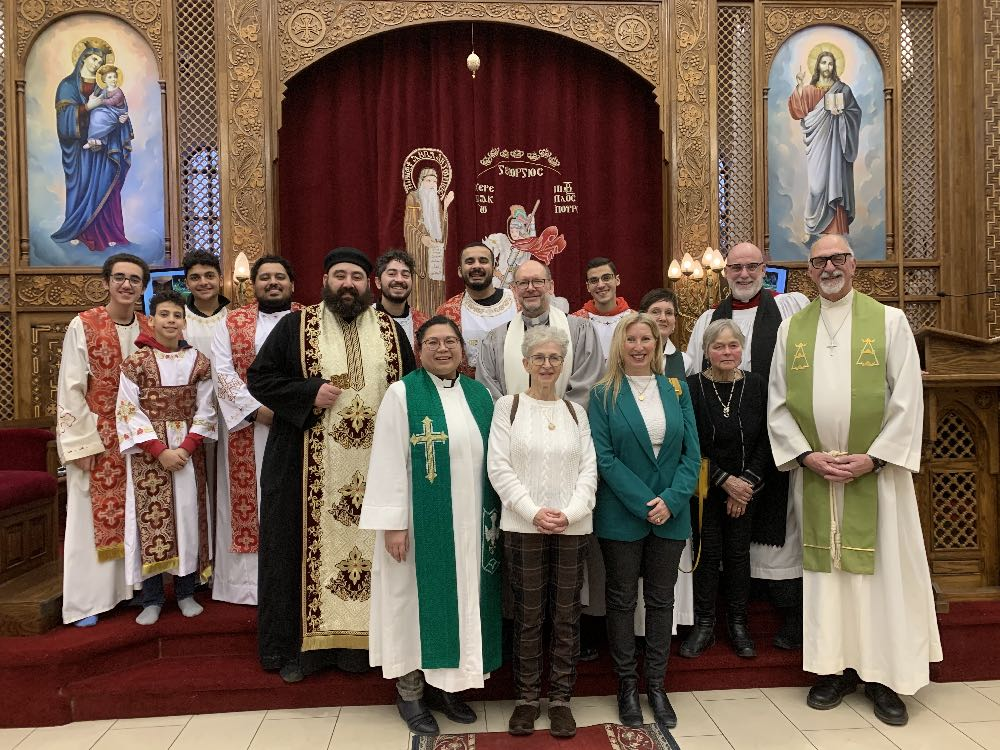The parish of St. George and St. Anthony Coptic Orthodox Church hosted the worship service for the 2024 Week of Prayer for Christian Unity.
The Rev. David Sherwin of the United Church, president of the Christian Council of the Capital Area (CCCA) welcomed all attending from various Christian denominations and thanked Father Anthony Mourad, the clergy and parishioners of St. George and St. Anthony for their warm welcome.
The congregation then enjoyed a liturgy enriched with beautiful Coptic music and chanting.
Anglicans were among the clergy participating in the service. The Rev. Chung Yan Lam, who is an ordained Lutheran priest serving as associate incumbent in the Anglican parish of All Saints is vice-president of the CCCA and helped organize this year’s events. Archdeacon Linda Hill read one of the lessons, and the Rev. Dr. Canon Peter John Hobbs delivered a homily centred on the gospel reading for the day from Luke 10:25-37, the parable of the good Samaritan.

Hobbs began by saying that his own experiences of seeking Christian unity “which I suspect is like that of many other Christians in our local context, is informal,” and takes place in conversations with family, friends, colleagues. “What strikes me in these informal, implicitly ecumenical relationships is that after a brief discussion of doctrine and differences, we very quickly find unity in the mission of the Church, the mission of God, the body of Christ, in the values of compassion and mercy at the heart of the gospel, and the practice of service and hospitality,” he said. “The foundation of our unity is our shared service to the world God loves.”
He described his professional ministry as director general of the Community Ministries of the Anglican Diocese of Ottawa. “This work is rooted in a much broader sector, that part of the social service sector which strives to address the most vulnerable in our midst, often around issues of homelessness, poverty, trauma, addiction, and mental illness. It is a sector marked by partnerships, collaboration, with people from all walks of life, from all backgrounds, striving to address human suffering.”
In this diverse interfaith pluralistic milieu, Hobbs said he meets a lot of Christians from all sorts of denominational backgrounds. “No surprise, given our core values and faith in Christ. The Christian unity we discover in service, grounded in compassion and mercy, also brings us into relationship with those of other faiths and backgrounds.”
Drawing the parallel to the gospel reading about the good Samaritan, he said, “Our differences fall away when we are moved by compassion, when we show mercy, when we stop abruptly on our way to address the suffering of another who is right in front of us.”
Now, there is a great need for all Christians and people of faith to work together to help the many in need. “The city of Ottawa is facing a profound crisis, not unlike many other communities in our country,” Hobbs said. “When one walks across many parts of our city, the evidence of homelessness and poverty is striking—people hanging out in the streets, sleeping, openly using drugs, making encampments across our cities, in churchyards, underpasses, parks, walkways, doorways. Increasingly more and more people have fallen into desperate situations.”
He noted that in Ottawa, the number of newcomers seeking shelter increased by 165% in 2023 and many refugee claimants and asylum seekers find themselves without resources or places to stay. “For the first time, there is not enough shelter space to accommodate everyone looking for a bed or a mat to lay their head. It is a struggle to manage the influx of vulnerable people, shelters and social service agencies are overwhelmed.
“The incidence of drug overdoses is on an exponential rise as toxic, deadly drugs are hitting the streets. People are dying. We are struggling to keep people alive for just another day.
Frontline staff administer on a daily basis Naloxone to people who have overdosed, each day, saving lives,” he added.
He noted that many Christians, as individuals and congregations, are already engaged in work help the most vulnerable and have been for a long time.
For those asking, “What can we do? Hobbs had this advice:
“Homelessness is a failure of public policy, and it starts with affordable housing and well-resourced support services. We need to advocate, in no uncertain terms, that truth. …
“We can learn, we can proclaim, we can advocate, and we can serve. We serve in many different ways, as leaders, donors, joining committees, sitting on boards, as frontline workers and volunteers, we can serve as congregations and individuals….There will be no shortage of opportunities to serve, so give of yourself. Follow the invitation of Jesus, who in reference to the Samaritan said, Go and do like this…..Our unity, our hope, is in our shared compassion.”
The parish of St. George and St. Anthony has a special focus on helping youth, particularly youth affected by life on the street, and donations from the service were dedicated to that work.


Saint Mary’s Church, Westmeath — Deanery of the Northwest